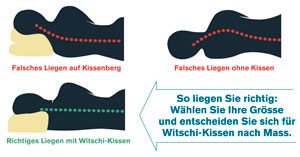
Neck pain or frequent tension?

often the wrong pillow is also the cause of shoulder/neck pain
The causes of neck pain are manifold. They often occur due to tension or cramps in the neck muscles, adhesions in the fascia tissue, due to incorrect lying or sitting, stress or even a cold.
In car accidents or falls, they can also be a symptom and consequences of whiplash or vertebral fracture. Wear processes such as osteoarthritis or disc damage (e.g. a herniated disc in the cervical spine), on the other hand, occur rather rarely.
Common symptoms of neck tension:
- Headache, migraine
- Fatigue
- Dizziness
- Ringing in the ears (tinnitus)
- Nausea and vomiting
- Visual disturbances
- Fever
If you experience sensations such as tingling, burning or numbness, certain nerves may be irritated or damaged. In this case, it is advisable to see a doctor as soon as possible to rule out a potential herniated disc in the cervical spine. Various viral diseases can also cause neck stiffness.
However, the most common causes are, wrong lying, wrong posture and especially stress in everyday life.
What can you do?

Rebalancing - mindful fascia massage therapy
For neck pain, the appropriate therapy generally depends on the cause. Heat applications such as fango, red light, etc. could alleviate the discomfort, but above all, gentle massage and loosening of the fascia structures often bring the most effective relief.
A gentle massage method for releasing fascia and muscle tension is Rebalancing Fascia Therapy. This is the method I use most often, along with reflexology, to provide relief for my clients.
Of course, people are sometimes quick to resort to painkillers or anti-inflammatory drugs, but this is more of a symptom control than a cause control, especially in the case of tension caused by stress and incorrect lying. It always pays to research the cause together with your doctor and body therapist before the symptoms become chronic and then more difficult to treat.
Important: If complaints persist for more than 3 months and remain untreated, they often develop into chronic symptoms, which can then only be treated with a lot of effort, time and patience. Therefore, do not wait too long before agreeing on the first measures, such as treatment.
Find out and change causes
- Are you lying correctly?
-> Here, the head pillow and possibly also your mattress should be put to the test.
 Tips:
Tips:
In many furniture stores and mattress stores you can get advice and often test lying.
When it comes to pillows, I recommend investing in a good orthopedic neck pillow. From personal experience and as a body therapist, I swear by the CLASSIC and DELUXE orthopedic neck pillows from the Swiss company Witschi, for example. I have been sleeping very well on this model for over 20 years. Of course, already on the third, because pillows should also be renewed after a few years, just like mattresses.
- Are you sitting correctly?
-> An upright posture is the be-all and end-all. Adjust the height of your seat and table so that your elbows are at right angles to the table in an upright position. When working on the computer, the top edge of the screen should be at eyebrow level.
Tips:

Sissel inflatable seat cushion
Check your office chair and, if necessary, replace it with a more ergonomic version. It is best to seek advice from a specialist back store. I have had very good personal experience with the inflatable seat cushion from the company Sissel. It allows a natural upright posture and the spine remains in motion, in contrast to static sitting. In general, however, it is recommended to change several times during the day from a static to a dynamic-moving sitting posture, to work more often standing up and to take breaks from movement (e.g. with stretching exercises).
- What is stressing you? What circumstances are throwing you off balance?
-> Stress and tension are one of the most common causes of shoulder and neck pain. So it's not just posture that's at play here and the cause of the problem, but often our own inner attitude and external circumstances that throw us off balance, cause us to tense up and "be stressed". Setting boundaries, saying no, asking others for help, these things trigger discomfort and stress in many people, which can often lead to shoulder and neck tension. How about you, ever said NO today without a guilty conscience or asked someone for help?
Tips:
Give yourself a rest and a break for regeneration more often. Do something good for your body and soul.
This can be a walk in nature, sports, meditation, yoga or even a soothing massage that brings them back into balance. If you would also like to work a little on your "posture" while doing this, then Fascia Therapy Rebalancing may be just the thing for you. In case of recurring and burdensome stress stimuli and consequently similar behavior/reaction patterns, wingwave coaching can support and provide relief.
I hope you found some valuable information and inspiration in this BLOG post.
I wish you a very "relaxed" time and positive changes.


